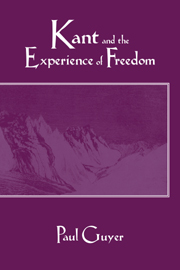Book contents
- Frontmatter
- Contents
- Preface
- Note on citations
- Introduction
- KANT'S AESTHETICS IN HISTORICAL CONTEXT
- KANT'S AESTHETICS AND MORALITY: TOPICAL STUDIES
- Chapter 6 The beautiful and the sublime
- Chapter 7 Nature, art, and autonomy
- Chapter 8 Genius and the canon of art: a second dialectic of aesthetic judgment
- Chapter 9 Duties regarding nature
- Chapter 10 Duty and inclination
- Notes
- Bibliography
- Index
Chapter 8 - Genius and the canon of art: a second dialectic of aesthetic judgment
Published online by Cambridge University Press: 05 March 2012
- Frontmatter
- Contents
- Preface
- Note on citations
- Introduction
- KANT'S AESTHETICS IN HISTORICAL CONTEXT
- KANT'S AESTHETICS AND MORALITY: TOPICAL STUDIES
- Chapter 6 The beautiful and the sublime
- Chapter 7 Nature, art, and autonomy
- Chapter 8 Genius and the canon of art: a second dialectic of aesthetic judgment
- Chapter 9 Duties regarding nature
- Chapter 10 Duty and inclination
- Notes
- Bibliography
- Index
Summary
AUTONOMY AND INTEGRITY IN TASTE
“That the imagination should be both free and yet of itself conformable to law, that is, that it should carry autonomy with it, is a contradiction” (CJ, §22 General Remark, 5:241). So Kant writes to express as a paradox the epistemological problem that the feeling on which an aesthetic judgment is based must be free of the constraint provided by determinate concepts, for otherwise there will be no reason why it should be pleasurable, yet must also be subject to some kind of rule, for otherwise the claim of universal validity which this judgment asserts will be irrational. And so understood, the remark is entirely rhetorical, for it is the express purpose of Kant's main argument in the “Critique of Aesthetic Judgment” to show that this conception of the judgment is coherent rather than contradictory. But taken out of its intended context, the remark need not be merely rhetorical, for it can be seen as an expression of competing demands for aesthetic integrity: demands for individual freedom on the one hand and social agreement on the other, demands which, unlike the two epistemological constraints on aesthetic judgment, cannot be simultaneously satisfied but instead introduce a permanent source of instability into the history of art and taste. Indeed, it is even fitting that Kant's remark has to be taken out of context to be given this interpretation, for although Kant lays the theoretical basis for such a picture of art history, he also tries to suppress its consequence and to avert the destruction of the eighteenth-century ideal of aesthetic stability which is its inevitable outcome.
- Type
- Chapter
- Information
- Kant and the Experience of FreedomEssays on Aesthetics and Morality, pp. 275 - 303Publisher: Cambridge University PressPrint publication year: 1993

